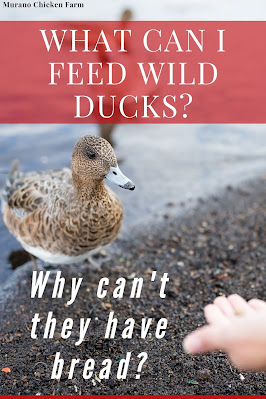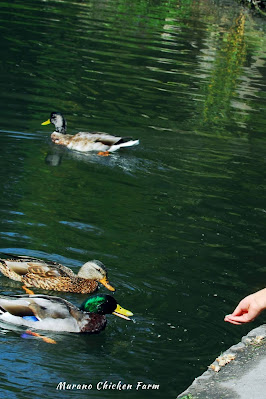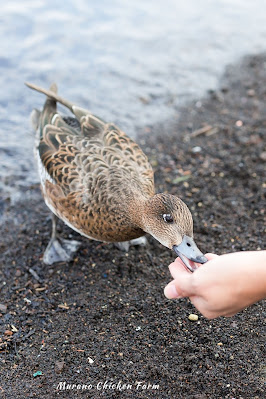Growing up, we used to go to the park every winter and feed the ducks. Like everyone else, we would take bags of half stale bread, uneaten crackers etc. We had no idea how bad it was for them, we just knew they swarmed us like they were starving.
Unfortunately, bread was the worst thing we could have given them! Of course, eating bread is better than starving and often the population of ducks in local parks outgrows available resources, especially when winter comes.
Why can't you feed ducks bread?
There are lots of reasons why you shouldn't feed bread to wild ducks and geese and the most important one is nutrition! It has calories which they might need, but practically nothing in the way of necessary vitamins and minerals.
To ducks bread is like junk food and they would rather eat it than look for their own foods.
A ducks natural foods are grasses and weeds, worms, bugs and small minnows. These are all full of healthy things that will be missing in their diet if they eat a lot of bread or crackers instead.
Health problems caused by vitamin deficiency in ducks
One particular vitamin ducks need a lot of is niacin. Lack of niacin can cause a problems in the legs of growing ducklings. It will cause the legs to grow outward in a bowed appearance which makes it difficult to walk.
Feeding foods low in vitamins and other nutrients can also cause a disorder called angel wing which will make it impossible for the duck to fly, and most wild ducks fly from pond to pond and some even migrate in winter!
Developing angel wing can cause a duck to be abandoned by it's flock and a solo duck is not likely to make it very long on it's own!
This can be a huge problem when living in the wild and white bread has very small amounts of niacin which can cause or exacerbate a problem.
What to feed wild ducks
It would have been much better for the ducks of my childhood if we had brought more appropriate foods like: bird seed, chopped fruit and vegetables or mealworm chicken treats.
Some of my ducks and geese favorite treats are:
- Frozen peas, green beans or corn kernels
- Cracked corn & birdseed
- Chunks of ripe banana, cut up strawberries (including the tops) watermelon, apple, grapes, raspberries, pear, peaches, cantaloupe, string beans, cucumber, torn pieces of lettuce and blueberries.
- Oats, whole grains like barley, wheat or rye.
Avoid feeding ducks bread, crackers, potato chips, popcorn, anything with chocolate, citrus fruits and anything from the nightshade family which includes tomatoes, eggplant, potatoes and peppers.
Just like for people, wheat bread is better for ducks than white bread and brown rice is better for ducks than white rice.
Both have more niacin and other vitamins than the more refined versions so wheat bread and brown rice are not AS bad, but still shouldn't be the majority of what you feed.
You can find an entire list of treats that are healthy for ducks in: What treats do ducks eat?
You can also purchase wild duck food or even chicken layer feed to give to wild ducks. This is the best option as it has all the vitamins and minerals ducks need for healthy growth.
Do not just dump out a bag of duck feed! It will attract other animals and quickly go rancid if it gets wet. Toss out a handful at a time and stop when the ducks become less interested in the food.
Should you feed wild ducks?
On the other side of the coin, too much feeding is unhealthy and can create excess waste and pollution that can destroy habitats.
Left over, uneaten food can attract rodents and spread diseases. Pieces of bread floating in the water can start to spoil and can even effect the algae levels in the water!
Of course you can't control what other people do, so take a look around and if you see excess food left out for the ducks, don't add to the problem.
While it is great that you are here looking for options for feeding wild ducks I have to caution against feeding wild ducks year-round.
Unfortunately, when wild animals become dependent on food from people not only is it dangerous for them to become overly friendly to humans (not all humans are kind to animals!) but it can help the animal population to grow to unusually high numbers.
If humans are feeding the wild animals and they become accustomed to that they will not be able to find enough food if the people stop feeding them for whatever reason.
Also, wildlife tends to keep itself in check and if the population grows too quickly it can ruin the ecosystem when they start eating grasses and weeds faster than they can grow.
It is a myth that feeding ducks and geese in the winter will keep them from migrating. While many birds do migrate south for winter, many others stay put...especially in small parks. If you are going to feed the wild ducks, winter is the time to do it.
Many of the bugs and worms that ducks eat are hibernating for winter and the grasses and weeds have stopped growing, so they could use a helping hand then. Stop feeding when spring comes around though as they will be able to find their own food.
Ducklings hatch in late spring or early summer and if a mama duck is raising her babies to look to people for food, then they will most certainly have nutrition problems when they can't forage for their own food.
Ducks that grow up with a dependency on humans for food could even die over winter if enough people don't feed them! So it's really best to not feed them in the warm months.
Feeding wild ducks is a great way to spend some time in nature and be helpful to the waterfowl, but it should be done to help them through lean times only.
Trying to choose a breed of duck to raise at home? Here's why KCs might not work for you: Khaki Campbell ducks can fly! (Really well!)
~L
Want information on raising chickens sent right to your email weekly? Click right here to join my list and get new posts sent directly to you the day they're published ... plus, you'll also get the free download '25 Ways to save money raising chickens'.




No comments:
Post a Comment